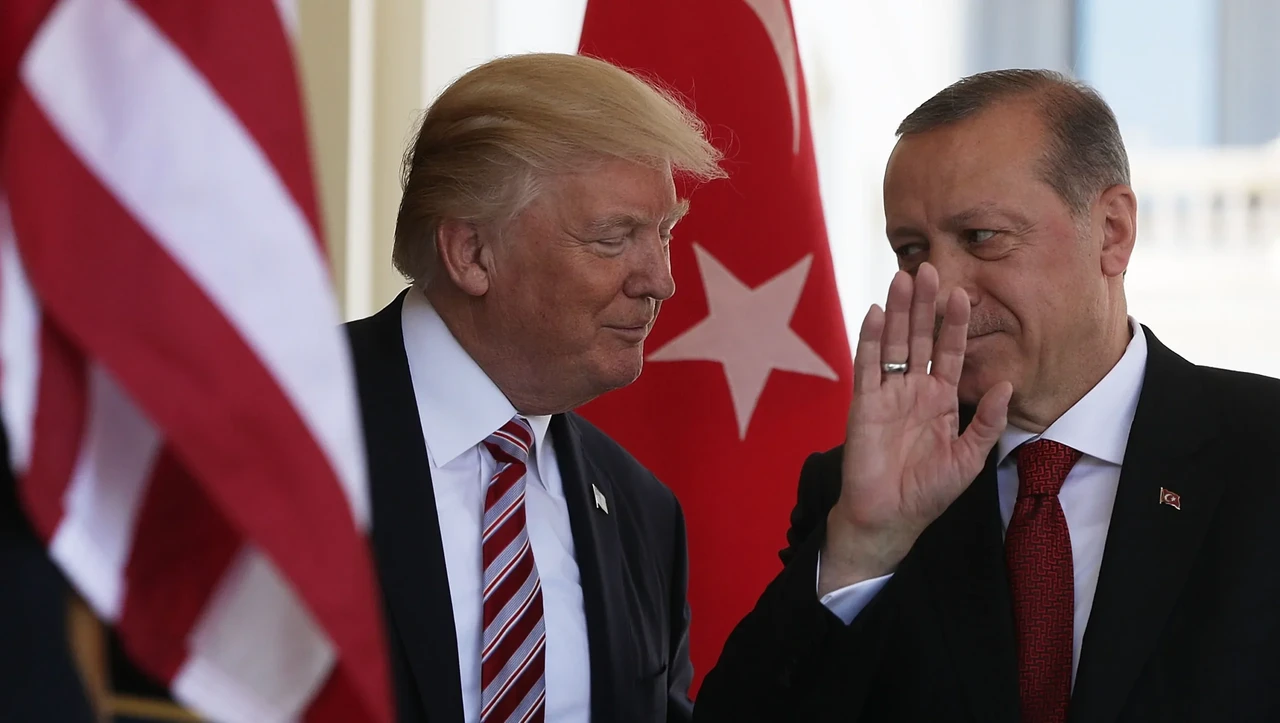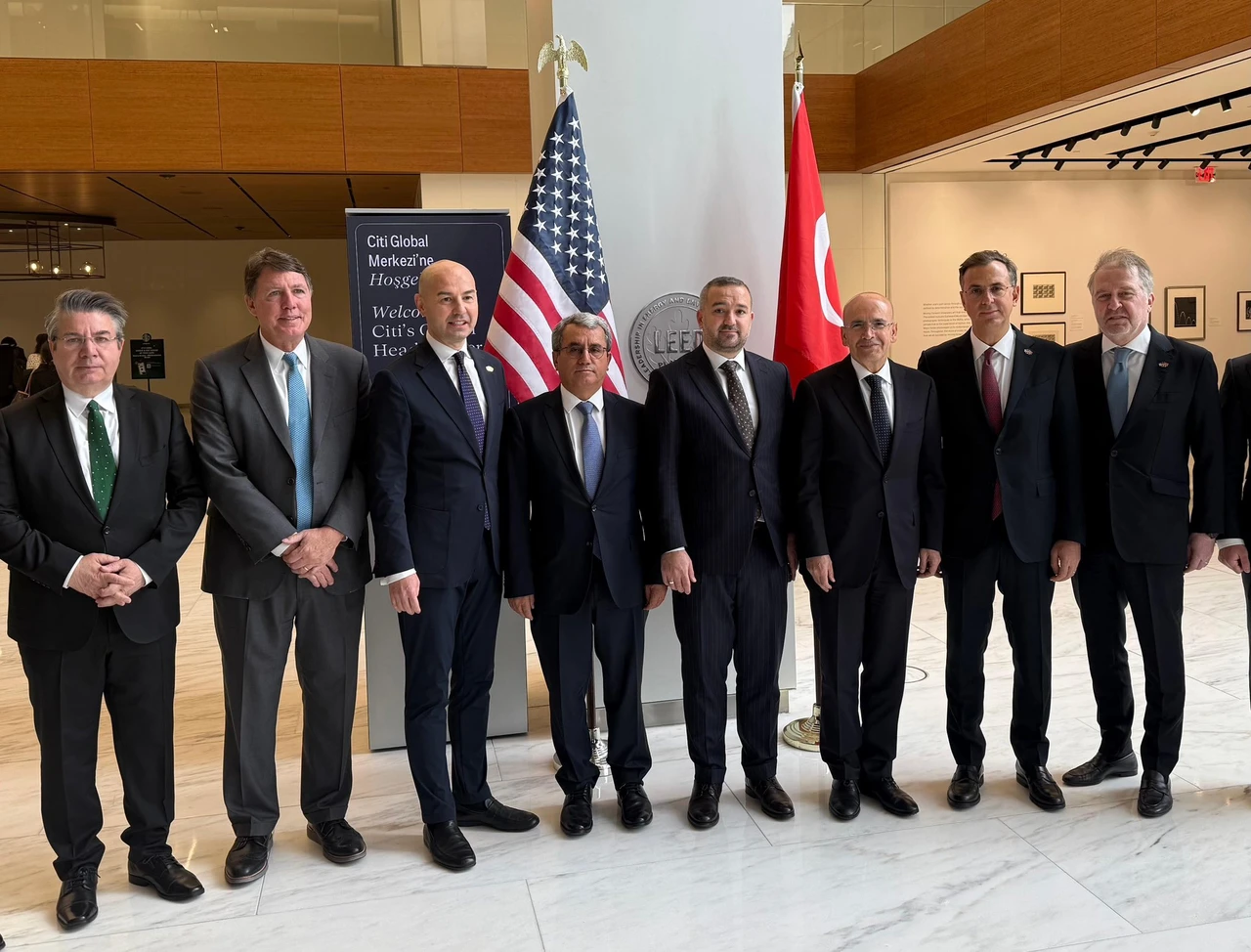US election could redefine Türkiye’s alliances, Turkish intel analysis suggests
 U.S. President Donald Trump welcomes Turkish President Recep Tayyip Erdogan outside the West Wing of the White House in Washington, U.S. on May 16, 2017. (AFP Photo)
U.S. President Donald Trump welcomes Turkish President Recep Tayyip Erdogan outside the West Wing of the White House in Washington, U.S. on May 16, 2017. (AFP Photo)
A new analysis from the National Intelligence Academy indicates that Türkiye, along with several other nations, may reassess and potentially restructure its relations with the United States in the near future. The report suggests that a renewed partnership could emerge between Türkiye and the U.S., rooted in overlapping regional interests, particularly in defense and counterterrorism.
2024 U.S. presidential election as a global turning point
The analysis highlights the significance of the upcoming 2024 U.S. presidential election, viewing it as a critical juncture that could redefine America’s role on the global stage. According to the Academy, the election will serve as a key indicator of whether the United States will continue to assert its leadership, seek a redefined role, or choose to share its influence with other major powers. This decision is seen as pivotal in shaping the future global order.
Republican foreign policy strategy: strengthening deterrence and technological superiority
The report delves into the Republican Party’s foreign policy approach, which emphasizes deterrence, hybrid intervention methods, technological dominance, and economic strength. It characterizes former President Donald Trump’s “Make America Great Again” (MAGA) slogan as an extension of traditional Republican foreign policy priorities.
Under a potential second Trump administration, there appears to be a dual focus on reducing direct military engagements abroad while maintaining and even enhancing the U.S.’s global punitive capabilities. The Academy’s analysis notes that “Washington’s primary objective should be to establish a level of deterrence that renders any potential gains by adversaries meaningless, thereby preventing them from benefiting from their actions.”
Türkiye-U.S. relations: balancing risks and opportunities in a new era
A potential second term for Trump presents both challenges and opportunities for Türkiye, according to the report. Key among these is the possibility of overcoming restrictions in the defense industry, particularly concerning the F-35 program. This could pave the way for a positive agenda in Türkiye-U.S. relations, especially if Trump’s inclination to reduce overseas military presence leads to a reassessment of U.S. support for groups like the PYD/YPG, which Türkiye views as a terrorist threat. Such a shift could foster deeper cooperation between the two nations in counterterrorism efforts.
However, progress in these areas is contingent upon the composition of Trump’s administration and the prioritization of U.S. regional policies. The analysis points out that any significant developments will depend on how the new administration aligns its goals with Türkiye’s regional security interests.
Regional dynamics: Iran, Israel, and Eastern Mediterranean tensions
The report also touches on broader regional implications, noting that Trump’s potential return could intensify U.S. policies towards Iran, possibly escalating tensions that directly impact Türkiye’s security environment. Additionally, continued support for Israel’s normalization efforts with Arab nations could shift the balance of power in the Eastern Mediterranean, potentially to Türkiye’s detriment.
“The risk of regional conflict due to hardline policies against Iran may compel Türkiye to recalibrate its security strategies,” the report states. Meanwhile, increased Israeli influence, backed by unconditional U.S. support, could challenge Türkiye’s strategic interests in the Eastern Mediterranean. This could drive Ankara to deepen regional cooperation, particularly through dialogue with Egypt and Greece, to safeguard its maritime claims and energy exploration rights.
Potential for cooperation in Black Sea stability and economic ventures
Another notable area of potential collaboration highlighted in the report is Trump’s approach to the Ukraine conflict. Efforts to broker peace could lead to greater stability in the Black Sea, presenting economic opportunities for Türkiye, particularly in reconstruction projects where Turkish firms could play a key role. The analysis suggests that a stabilized Ukraine could serve as a gateway for enhanced Türkiye-U.S. relations.
China’s rise and Türkiye’s economic opportunities
On the global economic front, the report discusses Trump’s stance on China, which is expected to involve tariffs and sanctions aimed at bolstering U.S. economic supremacy. This approach could open new supply chain opportunities for Türkiye, especially in diversifying energy projects and enhancing trade ties. The Academy underscores that Türkiye could leverage this shift to position itself as a key player in alternative supply routes and regional energy initiatives.
As the 2024 U.S. election looms, the future of Türkiye-U.S. relations remains uncertain, with both risks and potential gains on the horizon. The evolving geopolitical landscape will test Ankara’s ability to navigate its strategic partnerships and regional alliances, setting the stage for a complex interplay of diplomacy and economic interests.



